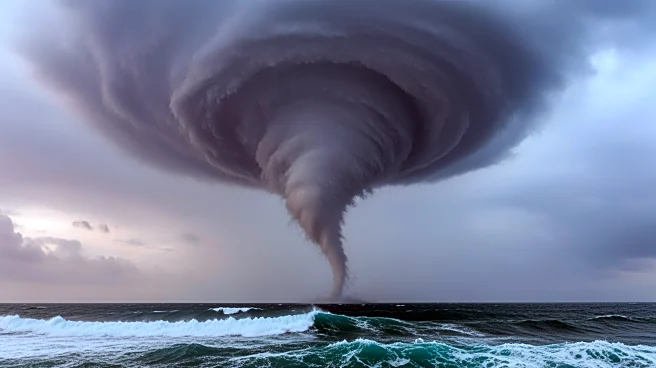What's Happening?
Typhoon Kalmaegi has caused widespread destruction in Vietnam and the Philippines, resulting in at least five deaths in Vietnam and 204 in the Philippines. The storm brought fierce winds and torrential
rains, flattening homes, uprooting trees, and causing significant flooding. In Vietnam, the provinces of Dak Lak and Gia Lai were particularly affected, with numerous homes damaged and power outages impacting over 1.6 million households. In the Philippines, the storm led to a state of national emergency, with President Ferdinand Marcos Jr. visiting the affected areas. The country is now bracing for another storm, Typhoon Fung-wong, which is expected to make landfall soon.
Why It's Important?
The impact of Typhoon Kalmaegi highlights the vulnerability of Southeast Asian countries to severe weather events, exacerbated by climate change. The destruction in Vietnam and the Philippines underscores the need for improved disaster preparedness and infrastructure resilience. The economic and social costs are significant, with thousands displaced and infrastructure severely damaged. The frequency and intensity of such storms are increasing, posing ongoing challenges for these nations. The situation also draws attention to the broader implications of climate change, as scientists warn of more frequent and intense storms in the region.
What's Next?
As Vietnam and the Philippines begin recovery efforts, the focus will be on rebuilding and providing aid to affected communities. In the Philippines, preparations are underway for the arrival of Typhoon Fung-wong, with evacuations and emergency measures being implemented. The international community may also play a role in providing support and resources for recovery. Long-term, both countries will need to invest in climate adaptation strategies to mitigate the impact of future storms.
Beyond the Headlines
The recurring nature of such natural disasters in Southeast Asia raises questions about the adequacy of current climate policies and the need for international cooperation in addressing climate change. The ethical implications of climate justice are also relevant, as developing countries like Vietnam and the Philippines bear the brunt of climate impacts despite contributing less to global emissions. This situation calls for a reevaluation of global climate commitments and support for vulnerable nations.











